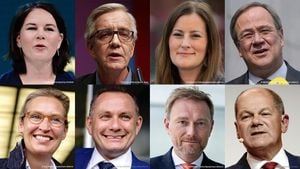Elon Musk, the world's wealthiest man, has recently drawn significant attention for his political comments and endorsements, particularly concerning Germany's far-right party, the Alternative für Deutschland (AfD). Following a tragic incident at a Christmas market in Magdeburg, where at least two people were killed and over 60 injured, Musk took to social media demanding the resignation of German Chancellor Olaf Scholz, describing him as "an incompetent fool." His direct tweet, sent on December 20, 2023, has spurred reactions from both political figures and the public.
The attack, which saw a driver ram his vehicle through crowds of holiday revelers, shocked the nation. Musk, ever vocal on issues he cares about, labeled the attack as "deliberate mass murder" and criticized the German government's response, particularly their handling of the suspected perpetrator's extradition requests. Such extreme rhetoric from Musk, who has previously tangled with various leaders, underlines his growing influence over political discussions—especially on social media platforms like X, which he owns.
Musk's comments have taken on even broader political significance considering the rise of the AfD, known for its anti-immigrant and far-right policies. The party has seen increasing support, with polls indicating they represent about one-fifth of the German electorate. At this pivotal moment, Musk publicly stated, "Only the AfD can save Germany," which has ignited support among far-right factions within the country. The co-leader of the AfD, Alice Weidel, expressed her gratitude to Musk, stating, "You are perfectly right!" Her response reflects the party's eagerness to leverage Musk's considerable following and influence to gain political traction.
Meanwhile, Musk's recent meetings at Trump’s Mar-a-Lago resort reveal the intertwining paths of these political figures and their shared ideologies. During this time, Donald Trump himself invoked figures from far-right politics, echoing populist sentiments and promises of significant political change. The AfD's supporters hope to replicate Trump’s brand of politics to solidify their base, with party members declaring intentions to provoke similar upheavals within Germany.
The ideological underpinnings of this transatlantic connection are deeply rooted, characterized by fear concerning immigration and cultural identity. The AfD's platform emphasizes remigration, which stems from the discredited narrative of the "Great Replacement," alleging systematically plotted demographic changes through immigration. Mabel Berezin, director of Cornell University’s Institute for European Studies, noted how the AfD, emboldened by Trump's rhetoric, envisions itself as the agent for similar reforms within Germany.
Musk's role has included the dissemination of information uncritically and sometimes inaccurately. This aspect of his involvement leads to broader concerns about the impact of billionaire influence on political discourse. His influence is not limited to Germany; experts have warned of his potential global effects stemming from his actions on X. For example, misinformation about bipartisan funding proposals aimed at government spending and management has circulated widely after Musk's comments, raising alarms among fact-checkers and political analysts.
The reach and influence Musk wields represent both opportunity and risk within democratic discourse, with some commentators advocating for stricter regulations to reinvestigate the power dynamic between social media and political agency. Discussions ensue about whether this trend would safely navigate the nuances of political representation and civic engagement or pave the way for oligarchic governance characterized by extreme views.
The intertwined fates of the AfD and the American far-right reflect not only the growth of populist sentiment across the Atlantic but also the variety of engagement opportunities these parties may find through figures like Musk. While Netherlands and Italy also witness similar narratives, the outcomes hinge on how voters respond to these political shifts. With the AfD announcing plans for upcoming elections, it remains to be seen how Musk’s endorsement and the party's messaging will thread through the public's consciousness.
With Germany on the verge of political upheaval, following Chancellor Scholz’s recent loss in confidence votes and the anticipation of snap elections, it is important to monitor the interplay of these far-right vectors globally. If history is any indication, movements taking root within the U.S. may find resonance elsewhere, leading to consequential shifts across Europe.
Final reflections on Musk's involvement highlight the potential repercussions on democratic structures, signaling to citizens and political analysts the importance of vigilance against extremist ideologies gaining traction through and supported by massive financial resources. The connection between social media influence and resurgent populist movements constitutes a significant narrative within contemporary political landscapes, extending beyond party lines and potentially threatening longstanding democratic norms.



